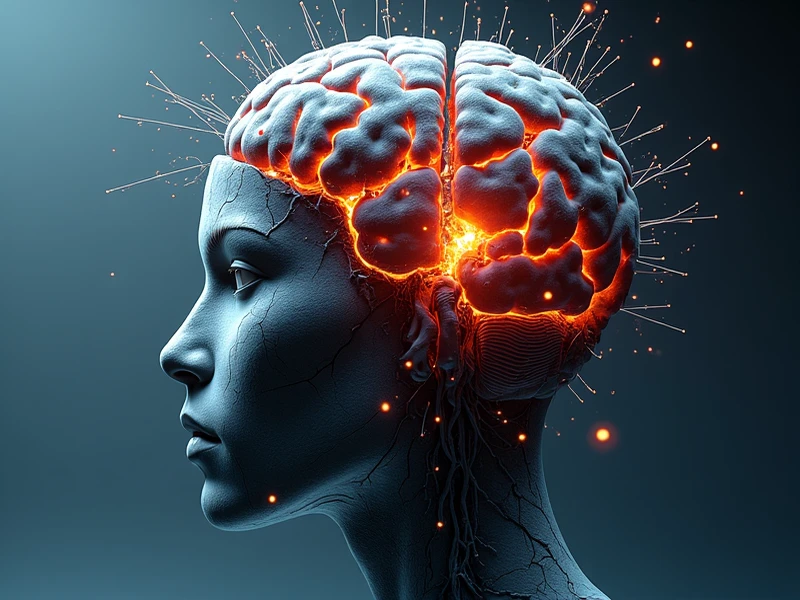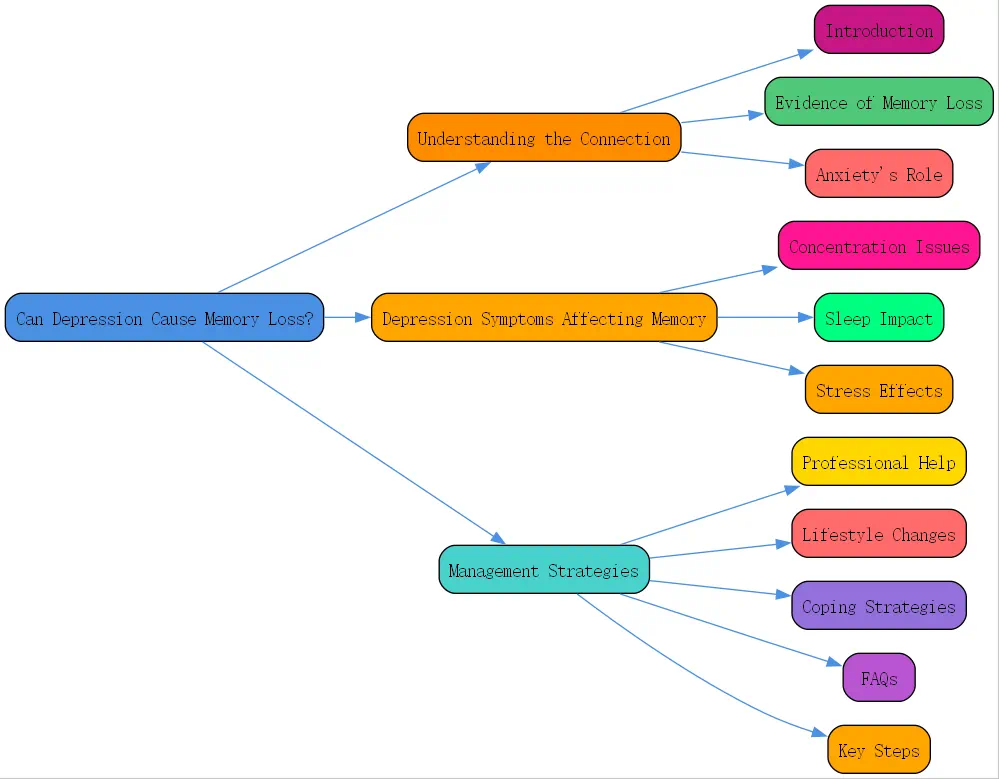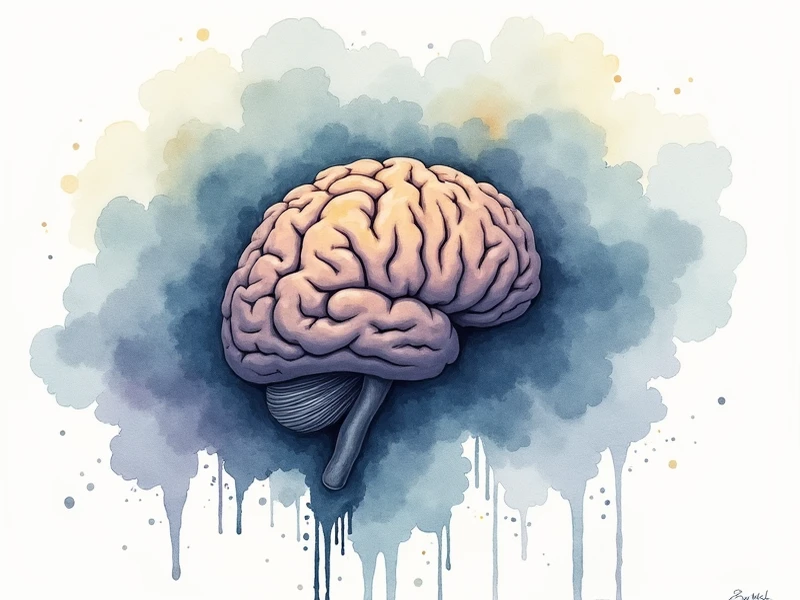Can Depression Cause Memory Loss? Understanding the Connection


Introduction: Exploring the Link Between Depression and Cognitive Function
Depression is a complex mental health condition that goes beyond feelings of sadness. It often includes a range of symptoms, such as lack of energy, difficulty concentrating, and even physical issues like sleep disturbances and appetite changes. Many people struggling with depression report challenges with their memory, leaving them to wonder—can depression cause memory loss?
The link between depression and memory loss has long intrigued researchers and mental health professionals. Evidence suggests that depression can negatively impact cognitive function, including memory retention and recall. Understanding this connection is crucial, not only for managing depression but also for improving overall brain health.
Let’s explore the science behind how depression and anxiety influence memory, along with actionable tips to support mental and cognitive well-being.
Does Depression Cause Memory Loss? Examining the Evidence
The relationship between depression and memory loss centers on how depression affects brain function. Chronic depression disrupts the brain’s ability to process information efficiently, particularly in areas responsible for attention, memory, and decision-making.
Research suggests that depression can lead to impairments in short-term memory and working memory—both of which are essential for daily functioning. For example, it may manifest as difficulty remembering appointments, completing tasks, or recalling recent conversations. These cognitive symptoms are often compounded by problems with concentration, further exacerbating the perception of memory loss.
One of the primary reasons depression affects memory lies in its impact on the hippocampus, a brain region that plays a critical role in memory processing and emotional regulation. Studies have found that prolonged depression can lead to shrinkage in the hippocampus, which increases susceptibility to memory-related issues.
Moreover, individuals living with depression often experience cognitive fog—a state of mental cloudiness where focusing, organizing thoughts, and remembering even small details may feel overwhelmingly difficult. In such cases, memory loss is not necessarily permanent but rather a symptom that improves with effective treatment.
Depression, Anxiety, and Memory: Unpacking the Complex Relationship
Depression frequently overlaps with anxiety, creating a complex interplay that further impacts cognitive functioning. Anxiety heightens stress levels in the body, triggering the release of stress hormones like cortisol. While cortisol serves an important purpose in survival situations, excessive production over time can impair brain cells and damage memory.
When anxiety and depression occur together, the compounding effects on memory loss can be particularly severe. People struggling with anxiety may find themselves trapped in cycles of overthinking and worry, which make it difficult to focus on the present moment or retain information. This can lead to missed details, forgotten tasks, and feelings of frustration.
High levels of anxiety can also exacerbate physical symptoms—including sleep disturbances—which directly affect memory consolidation. Individuals experiencing both anxiety and depression may need personalized treatment approaches to effectively address these interconnected challenges.

Symptoms of Depression That May Contribute to Memory Issues
Concentration Difficulties and Forgetfulness
One major way depression contributes to memory loss is through difficulties with concentration. People often describe a sense of “brain fog” that makes staying focused on tasks nearly impossible. Depression reduces motivation and cognitive sharpness, causing forgetfulness or perceived memory lapses.
For instance, distractions may become more frequent, and even simple tasks like reading or writing may require significant effort. This lack of mental clarity fosters the feeling that memories are slipping away when, in reality, the brain struggles to encode information properly due to diminished concentration.
Impact of Sleep Disturbances on Memory
Sleep problems are a hallmark of depression, and they play a significant role in memory loss. Many individuals with depression suffer from insomnia or hypersomnia (excessive sleeping), both of which interfere with the brain’s ability to consolidate memories.

Sleep is essential for converting short-term memories into long-term storage. Without adequate rest, the brain struggles to organize and retain information, leaving individuals to experience forgetfulness or difficulty recalling facts.
For example, someone with insomnia might experience fragmented thoughts and find it hard to retain even simple instructions, while hypersomnia may leave someone feeling sluggish and mentally disconnected. Addressing sleep issues often becomes a critical step in managing depression-related memory problems.
Stress, Anxiety and Memory Problems
Stress significantly impacts memory, and the emotional toll of depression and anxiety adds to the problem. Chronic stress leads to elevated cortisol levels, impairing the brain’s ability to form new memories and weakening recall.
Additionally, stress and anxiety can overwhelm cognitive processing, causing mental distractions that hinder information retention. Persistent feelings of fear and uncertainty—common in both depression and anxiety—may push memory-related tasks to the background, leaving individuals feeling scattered and frustrated.
Strategies for Managing Depression and Improving Memory
Seeking Professional Help for Depression
If depression is interfering with your memory or daily functioning, consulting a mental health professional should be your first step. Therapists and psychiatrists can help determine the severity of your symptoms and recommend individualized treatment plans, including:
- Medication: Antidepressants can stabilize brain chemistry, improving concentration and reducing brain fog over time.
- Therapy: Cognitive Behavioral Therapy (CBT) helps break negative thought patterns, leading to better focus and cognitive clarity.
- Support Groups: Sharing experiences and gaining insights from others can lessen feelings of isolation and enhance emotional well-being.
When depression is managed effectively, cognitive functioning and memory typically improve. Seeking support early can prevent symptoms from worsening and help you regain control over your mental health.
Lifestyle Changes to Support Memory and Mental Health
Simple lifestyle adjustments can have profound effects on managing depression and improving cognitive health. Consider adopting the following strategies:
- Exercise: Physical activity boosts oxygen flow to the brain and supports hippocampal growth. Regular exercise reduces stress and enhances focus.
- Balanced Nutrition: Foods rich in omega-3 fatty acids, antioxidants, and whole grains can promote brain health and improve mood.
- Memory Training: Brain games, puzzles, or mindfulness exercises can sharpen memory and attention.
Incorporate relaxation techniques like meditation and deep breathing exercises to manage anxiety and improve memory retention.
Coping Strategies
During challenging times, coping strategies are essential for managing depression and associated memory issues. Try the following:
- Acknowledge Your Emotions: Understand that feelings of sadness, fear, or frustration are valid and seek support when needed.
- Maintain a Routine: Consistency in daily activities helps regulate emotional stability and promotes cognitive health.
- Limit Overexposure to Media: Reduce sources of stress by limiting social media use and news consumption.
Take small steps to rebuild your sense of control and prioritize mental self-care.
Q&A Section
Q: Can anxiety and depression cause memory loss together?
A: Yes, the combination of anxiety and depression can significantly impair memory. Anxiety heightens cortisol levels, which damages brain cells and weakens cognitive processing. When depression co-occurs, concentration issues, insomnia, and emotional distress further exacerbate memory problems. Addressing both conditions through therapy, lifestyle changes, and professional treatment is critical for restoring cognitive function.
Takeaways: Key Steps to Improve Memory While Managing Depression
- Seek professional support to treat underlying mental health challenges.
- Prioritize physical health through regular exercise and balanced nutrition.
- Practice mindfulness and memory training exercises to boost cognitive abilities.
- Limit exposure to stress and incorporate relaxation techniques into your daily life.
- Make sleep hygiene a priority to support memory consolidation.
By taking these steps, you can manage depression effectively and work toward improving both your mood and cognitive performance.
BrainTalking reminds readers that mental health is integral to overall well-being. If you or a loved one are struggling with depression, reach out to a trusted healthcare provider or support network today. Remember, effective treatment can help reclaim your cognitive clarity and emotional stability.




